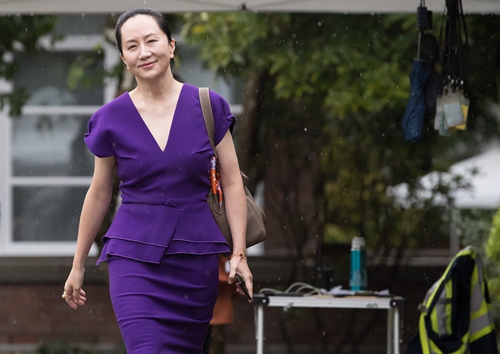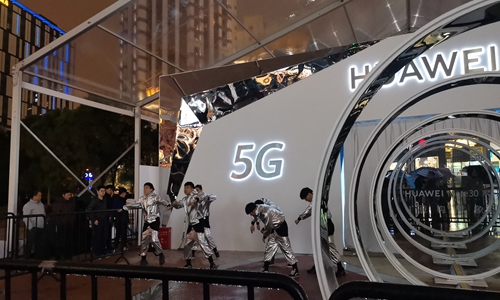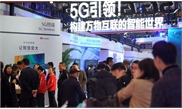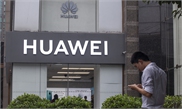
Huawei chief financial officer Meng Wanzhou, who is out on bail and remains under partial house arrest after she was detained last year at the behest of American authorities, leaves her home to attend a court hearing in Vancouver, on September 23. Photo: VCG
Calls were still loud Sunday on Chinese social media for the release of Huawei Chief Financial Officer Meng Wanzhou one year after her arrest in Vancouver airport at the request of the US.
Meng's case has evolved to be a linchpin in a stalemate between China and Canada, Chinese observers say, noting that breakthroughs made by the Chinese telecommunications giant over the past year prove that the US attempt to contain Huawei's achievements and China's technological rise has and will continue to come to naught.
On Thursday, Cong Peiwu, the newly appointed Chinese Ambassador to Canada, also paid a visit to Meng in Vancouver.
"The Chinese government is determined to protect the just and legitimate rights and interests of its citizens and enterprises, and will continue to urge the Canadian side to correct its mistake and take measures to solve the issue as soon as possible," Cong said, as quoted in a statement posted Friday on the website of the Embassy in Canada.
"The great motherland and nearly 1.4 billion Chinese people are your staunchest supporters. We expect you to go back to China safe and sound at an early date," the statement said.
The extradition proceedings for Meng, Huawei founder Ren Zhengfei's daughter, are scheduled for January, according to media reports.
Huawei has yet to respond to the Global Times' request for disclosure on the progress of the case.
The detention of Meng has deeply hurt China-Canada relations, and both Canada and the US have staked their international reputations on the case, Yang Xiyu, a senior research fellow at the China Institute of International Studies in Beijing, told the Global Times on Sunday.
The US request for Meng's extradition from Canada is destined to end in failure, he believed.
The extradition request was based on insufficient evidence, which means it would be impossible for the request to be justified in the Canadian legal system, Yang asserted.
A thorough and complicated procedure must be gone through before any extradition request is validated, he explained.
The case will most likely either become "a protracted juridical war that may last 10 years or even longer," or result in a solution that all the three sides involved can agree on, he added, stressing that the solution won't be what the US wants.
Huawei has also become a bone of contention in the China-US trade tensions, during which the US has launched multiple offensives against Huawei.

A temporary experience store of Huawei in Shanghai on Saturday Photo: VCG
In the words of Xiang Ligang, director-general of the Beijing-based Information Consumption Alliance, China has not given in at the trade talks with the US and Huawei has not collapsed amid the US-initiated blockage.
In a fresh move, the US Federal Communications Commission announced a decision on November 22 barring the use of an $8.5 billion government fund to buy equipment and services from Huawei and ZTE on national security grounds.
Huawei said it would make an announcement at an event in its Shenzhen headquarters on Thursday about filing suit to challenge the FCC decision.
The Shenzhen-based technology giant has reportedly secured over 50 commercial 5G contracts across the globe, with 28 from Europe, 11 from the Middle East, six from the Asia-Pacific, four from the Americas, and one from Africa, the company revealed in September.
Huawei said it had delivered over 200,000 5G base stations and built nearly two-thirds of all 5G base stations shipped globally.
The US blockage has prompted Huawei to shift toward Japan for imports of chips and other core components.
Meanwhile, the company has pioneered the nation's push for indigenous technological prowess, Xiang told the Global Times on Sunday.
Considering Huawei's flagship 5G system on a chip (SoC) as an example of the company's edge over its global rivals in terms of core technology, Xiang reckoned the company has largely weathered the US attempt to contain Chinese tech products and solutions.
The latest data from Berlin-based market intelligence platform IPlytics showed, as of November, Huawei's declared 5G patents total 3,325, topping the global 5G declaration rankings.
Companies following Huawei include Samsung with 2,846, LG with 2,463, Nokia with 2,308 and ZTE with 2,204.
The highest-rated US company is Qualcomm at seventh 7th with 1,330 declared 5G patents.



